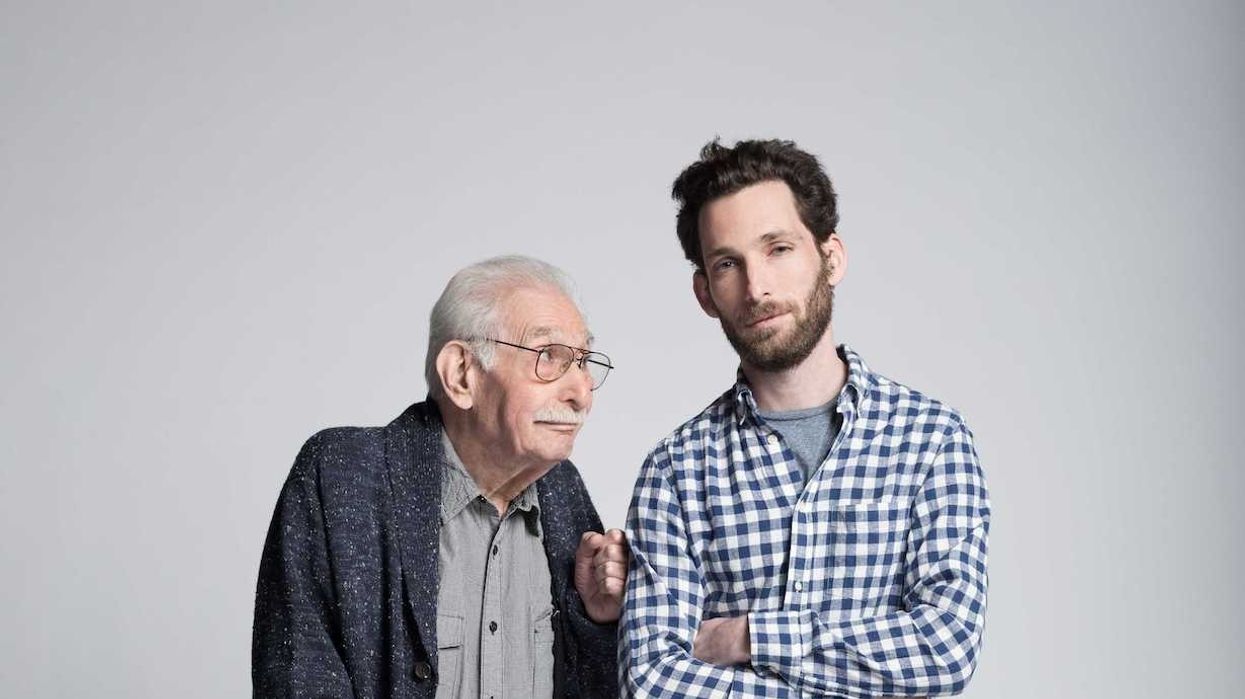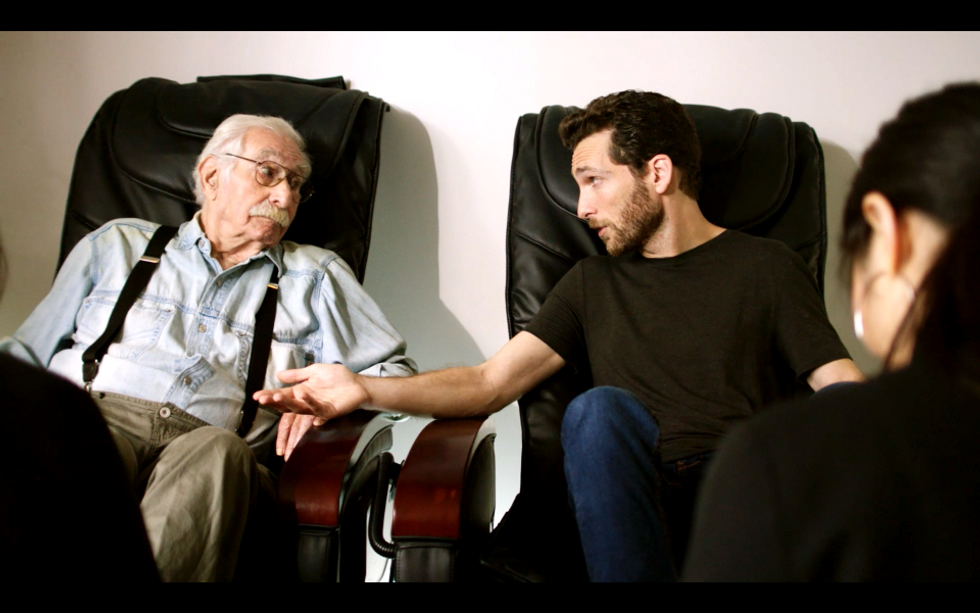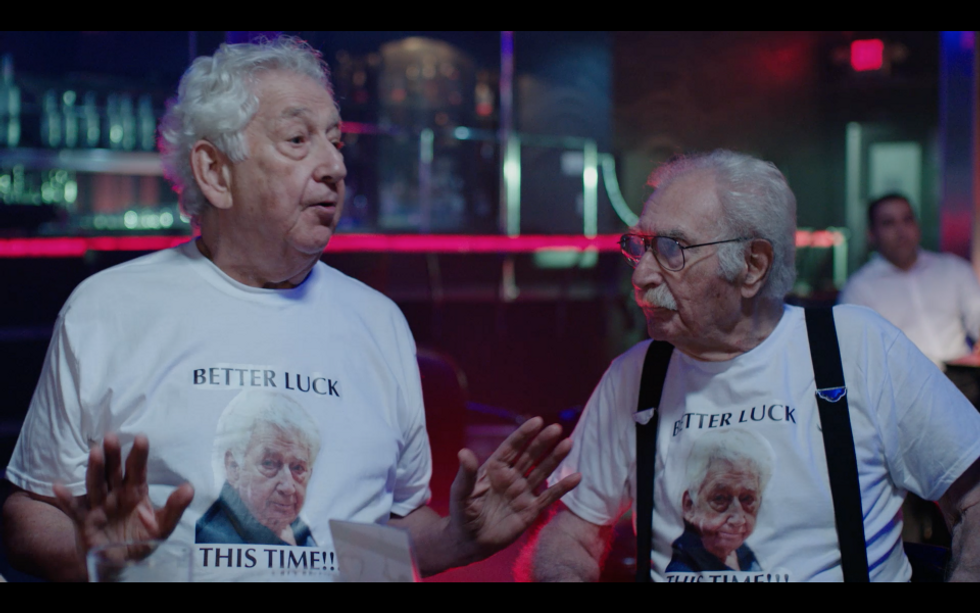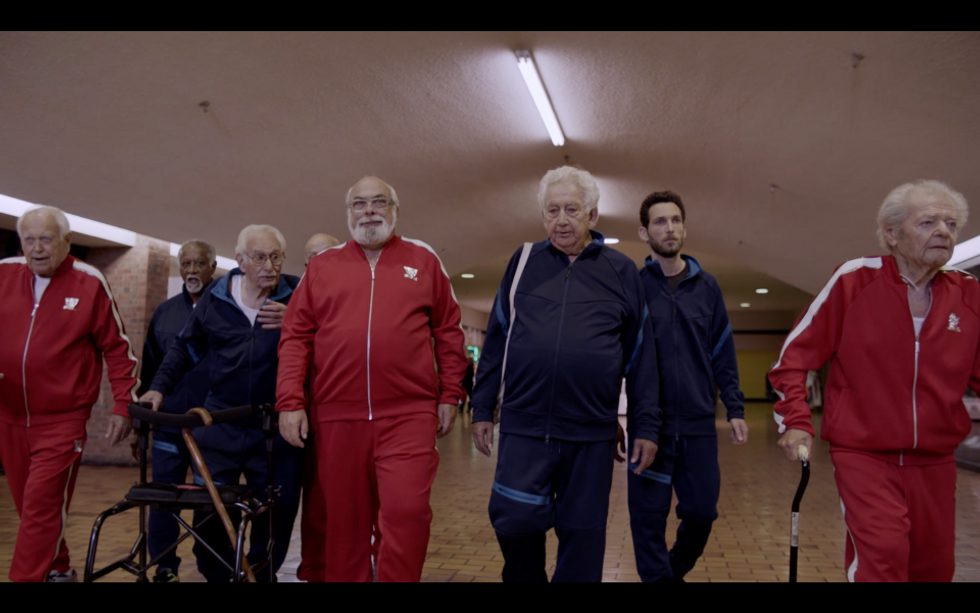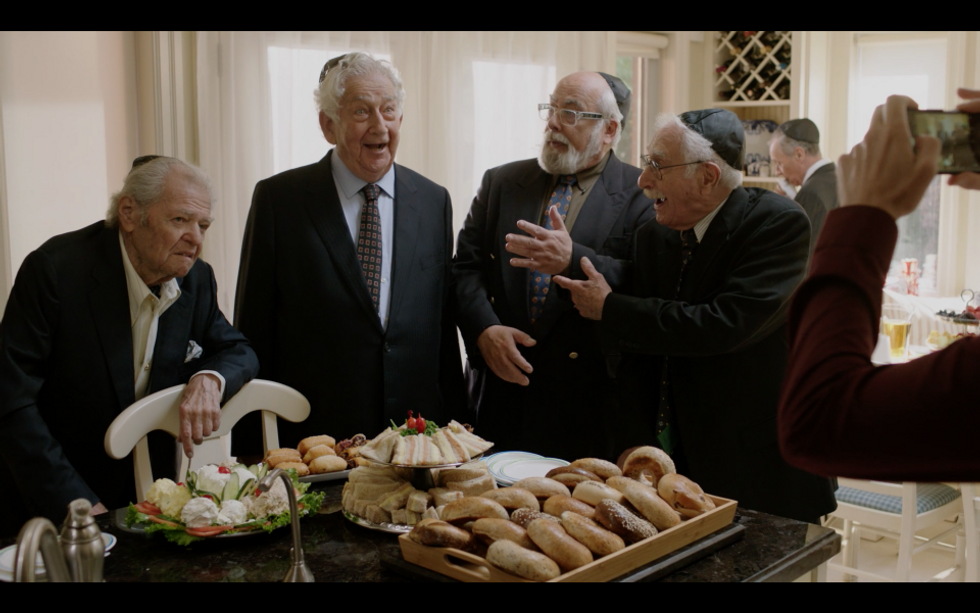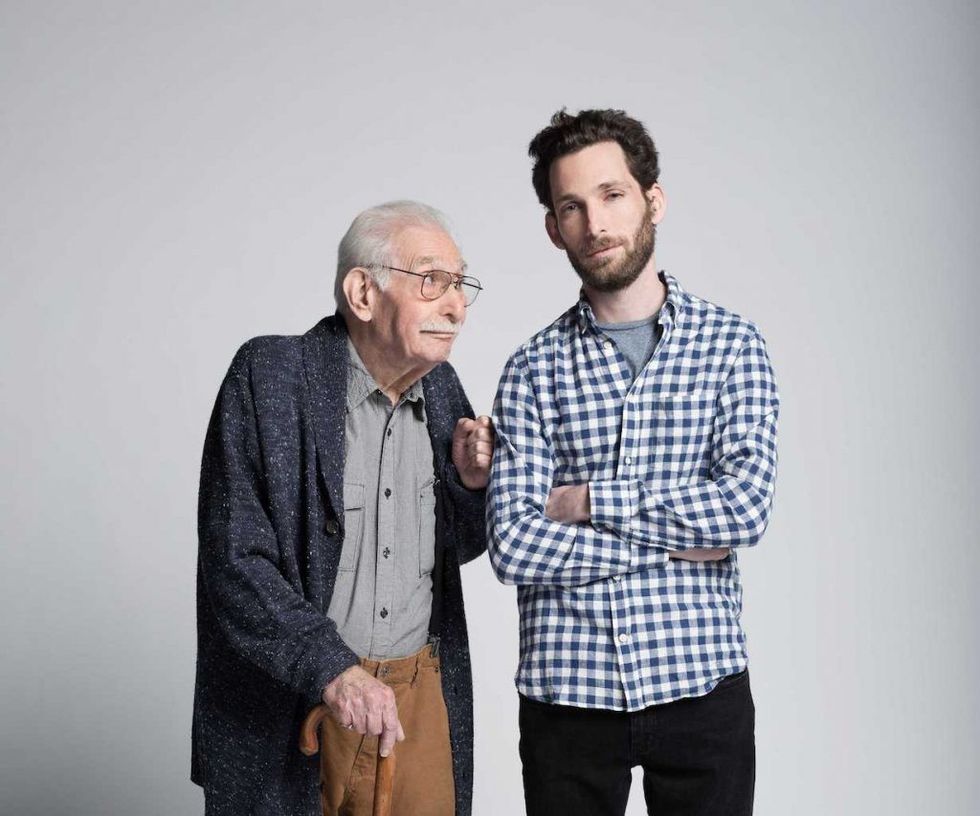
One evening, at a family dinner, Ethan Cole was sitting with his grandfather, Joe Cole. He started showing his grandpa how to use Tinder. The senior's reaction to the app was priceless. Suddenly, Cole's inspiration was limitless.
Then came Cole's series of videos with his grandfather called “Explaining Things To My Grandfather” for Funny or Die. Soon after, "My 90-Year-Old Roommate" was born.
The CBC comedy web series "My 90-Year-Old Roommate" is like 2018's answer to 1970's "The Odd Couple."
When a broke Millennial named Ethan (Cole) runs out of cash, he reluctantly moves in with his recently-widowed grandfather, Joe (Paul Soles), with nothing but a backpack, a box of condoms and a sense of entitlement.
Soon, 31-year-old Ethan introduces his 90-year-old grandpa to the wild ways of modern life and it's not long before this odd couple becomes a complementary couple.
Both characters are in ruts: Ethan is jobless with the sole ambition to get laid, while Joe has become increasingly detached from the world since his wife's death.
But, this living arrangement could be the best thing for each of them. They become positive forces in each other's lives.
Joe learns how to live again. Ethan learns the importance of preparing for his future.
The comedy is rooted in family and the roommate dynamic of two generations on either extreme. From Tinder dates to early-bird specials, "My 90-Year-Old Roommate" explores technology, mortality and relationships.
Now in its second season, we caught up with Cole to take you behind-the-scenes of the popular series and find out things about the show he's never been asked before ...
How did you pitch the show?
We pitched the show as an edgy, improvised show about a grandfather getting entwined in his grandson's life. As a proof of concept, we showed the video I had made that went viral of my grandfather going on Tinder. Once CBC saw this video, they were sold.
What's the difference between what we see on air and what you envisioned in your mind when you first conceptualized the show?
Season 2 feels close to the vision in my brain. But I think the show I first envisioned was a little darker. The show we ultimately made is a bit more accessible and fun.
These days we talk so much about Millennials and it seems we ignore our oldest generation. What do you feel we're missing by overlooking them?
They have so much wisdom. They can share and teach us so much. They've been on this planet a lot longer than we have.
What common connections do you find between Millennials and seniors?
Laughter. What I've learned working with seniors on this show is that they love to laugh. They don't take life too seriously, and they have a playfulness that's infectious.
Did you try rooming with your real-life grandfather prior to shooting? If so, how'd that go? (If not, we're petitioning for this to happen — and for it to be live-streamed.)
I am not a method actor, so nope. I am down to try this live stream experiment.
How long do you think you could handle living with your grandfather?
I could probably go one month. He's pretty hilarious, so it would be entertaining. And there would be free meals. So that's always nice.
How long do you think your grandfather could handle living with you?
One day. We like different TV shows. He wouldn't be able to handle it.
The series is written by you, David Lipson and Josh Shultz, and even your 92-year-old grandfather, Joe Cole, as a contributing writer. Walk us through the process and timeline for putting together a script for an episode.
It takes about two months to write all the scripts.
It usually starts with us coming up with about 50 thought-starters or themes we'd like to explore, such as "Live Streaming" or " VR" or "Racism and the elderly." And then we all get together and see what stories we can form from these thought-starters.
We have brainstorming sessions. And then over time we just mold the stories with the most potential into very detailed outlines.
It always starts with having a simple beginning, middle and end. We then try to see how we can make each scene more dynamic. Especially the intros.
For instance, in the Racist WiFi episode where I discover my grandfather’s friend has a racist WiFi password, we thought a lot about the discovery moment, where I find the password. And we ultimately decided that it should start with the friend and I playing with VR. Seeing a senior having fun with VR seemed like it would be an interesting way to open an episode.
We spend a lot of time thinking about what will happen in each scene, and how to amp the visual humour. But we don't write any dialogue. We just have very detailed outlines that we give to the actors and then we improvise the scene.
It's also a show where we don't rely heavily on jokes. If something really pops into our mind, we will include the joke in the outline, but it's rare.
This is really a show about the stories.
Season 2 started streaming a little while back and promises to deliver even more laughs and discomfort from live-streamed funerals, to elderly bachelor parties, the perils of self-diagnosis via online symptom checkers, and so much more. Where are these storylines rooted ... Where does the inspiration come from?
For us, the key is to find things that exist in the everyday life of a Millennial and explore how seniors would deal or respond to those events, technologies, etcetera.
So, we'll say, "Hey we want to do an episode on live streaming. What would a senior want to live stream?" Or if a senior found out about WebMD what might he do once he got obsessed with it?"
So, really it's always about asking a lot of questions. The key is also to make sure we are always touching on some truth.
Our formula for each episode is truth + imagination. So, we might say, "Look, we really want to explore the relationship seniors have with driving." And then think about the most imaginative ways to explore that idea.
In that case, it was through having a competition between my grandfather and me to see who was a better Uber driver.
Season 2 will also see guest appearances from the late-Verne Troyer (from Austin Powers) and online influencers Matthew Santoro and Azzy of the Youtube channel “Azzyland,” who have six million and four million YouTube subscribers, respectively. How does it feel to be capturing the attention of such notables with a subject (our older generation) that is oft ignored?
It felt great. Working with them was such a great experience.
They all loved the concept and added so much to the show. They appreciated that the show is about showing another side of seniors, that they're fun and playful and have a sense of humour. So it meant a lot that they got behind the concept.
You've been interviewed many times for your show. What three questions haven't been asked yet that you would like to answer? Go ahead and ask — then answer your own questions.
Which episodes were inspired by ideas from my actual grandfather?
My grandfather inspired the "Going Viral" episode in Season 2. Where he celebrates and has a party when he finally getting his disabled pass. My grandfather actually did that.
Why did you cut your grandmother out of the show? Why do you just live with just your grandfather?
[Editor’s note: That’s two questions, but grandparents deserve as many shoutouts as possible, so we’ll let it slide.]
We thought it would be simpler to just have a show where we could develop storylines between grandfather and grandson. It was probably a mistake. She's still mad at me.
Did you ever consider having someone else play you, once it was decided your grandfather wouldn't play himself?
Yes, we cast many other people, and I really was at first hesitant to play myself. But in the end, I think it works.
What did your grandfather have to say about all this when you pitched it to him? And what does he have to say about all this now?
When I originally pitched my grandfather to play the leading role in the series he just said, "I'm tired of carrying you. You're on your own."
We had made so many viral videos together, but his health wasn't great when we were thinking about making the series, so we couldn't put him as the lead. But he was very encouraging of the idea. And now he loves helping out as a writer.
He loves most of the episodes, but he's honest about the episodes he doesn't like. It's always fun to sit with him once we are done shooting, watch the episode with him and get his reviews. He can be harsh.
What's the biggest lesson you've learned from "My 90-Year-Old Roommate?"
Worry about telling good stories, not good jokes. That's what people remember.
